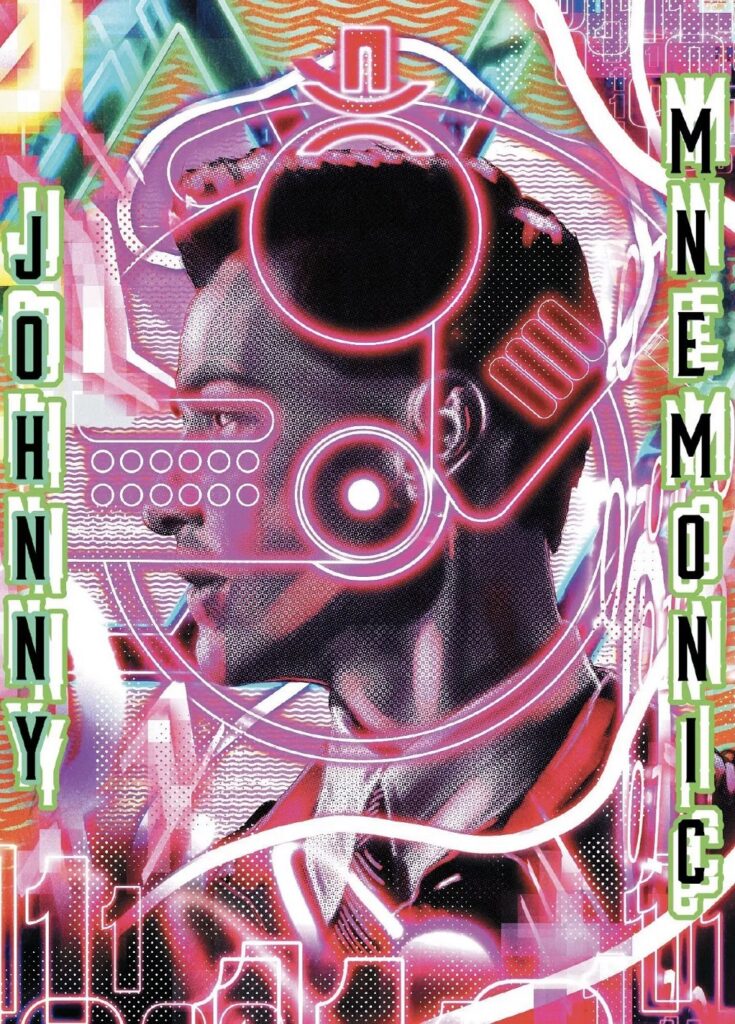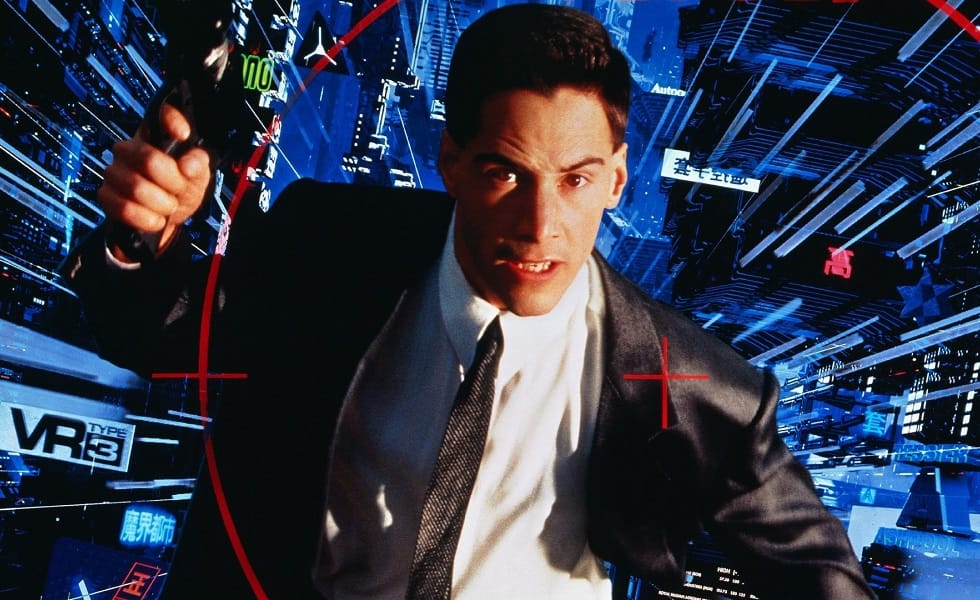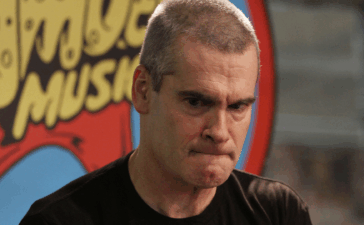With Neuromancer on the way, we look back at Keanu’s first foray into the Matrix.
With Apple’s adaptation of Neuromancer on the way, my thoughts have turned to other times William Gibson‘s work has been translated to the screen. That’s not an exercise that takes too long. For all that he’s the big dog of cyberpunk literature, Gibson’s work has inspired surprisingly few movies and TV series.
There’s Johnny Mnemonic, of course, the point of the exercise here. Then there’s Abel Ferrara’s 1998 version of New Rose Hotel, with Willem Dafoe, Christopher Walken, and Asia Argento, that few saw and fewer enjoyed. I did, to be clear, but I’m in the minority.
Gibson’s superb 1981 short story, “The Gernsback Continuum” became the pretty good short TV movie Tomorrow Calling by Tim Leandro in 1993. Amazon had a red hot go with The Periphery in 2022, but canceled it after one season. And that’s it!
Johnny Mnemonic, though…
Released to box office indifference and critical derision, Johnny Mnemonic has always been a bit of an unpolished gem. In fact, it looks better to me with age. It’s a fascinating artefact of mid ’90s cyber-culture – an example of what we thought (or hoped) the future might be like.
For sure, it’s dated, and not just in terms of technology. Some of the cultural assumptions were already hoary by the time the movie hit the multiplexes – Japanese global dominance for one. We can chalk that up to the long gestation period, perhaps. What seemed prescient in ’81, when the short story was published, was a spent notion by ’95.
But there’s an energy here, a ballsy kind of attitude and aesthetic. It reminds me of Walter Hill’s Streets of Fire, another relentlessly cool movie that fumbles the fundamentals. I love ’em both so much, I just wish they were good enough to recommend without caveats.

Having said that, Johnny Mnemonic seems to be enjoying a slow-building critical appraisal. 101 Films put out an excellent special edition blu-ray a few years ago, and that nets you the original cut, the longer Japanese cut, and the Tomorrow Calling TV movie. 2022 saw the release of Johnny Mnemonic: In Black and White, a monochrome version closer to director Robert Longo’s original vision.
And it turns out I was ahead of the curve on this one. I reappraised the film back 2017! So now we have a rare chance to reappraise my reappraisal, ahead of the broader reappraisal. Enjoy.
This game but messy adaptation of William Gibson‘s short story of the same name copped a critical drubbing on release but time has been kind to it, and it’s due for a measured reappraisal. Not that it’s a great movie; let’s face it, in terms of quality, cyberpunk cinema can pretty much be divided into two camps, with Blade Runner and Strange Days on one side and The Rest on the other. Still, it’s a fun watch, and there are plenty of enjoyable elements in play.
In the dark near future Johnny (Keanu Reeves on the crest of superstardom) is a mnemonic courier, carrying data too sensitive for normal transmission in a cybernetic implant in his brain. Taking on the fabled “one last job” – he wants the implant removed and his memories of childhood, which were yoinked to make way for the gadget, returned – he finds himself on the run from Pharmakom, a powerful pharmaceutical corporation, and the Yakuza, in the form of laser-whip-wielding Shinji (Denis Akiyama). The data he’s carrying is the cure for Nerve Attenuation Syndrome, an epidemic neurological disease, and something Pharmakom don’t want made public. Johnny teams up with freelance bodyguard Jane (Dina Meyer) and goes on the run, but he needs to hustle – he’s overloaded his implant’s capacity by a whopping 160Gb (!) and if he doesn’t dump the data soon, it’ll kill him.
Directed by artist Robert Longo from a script by Gibson himself, Johnny Mnemonic is a very uneven affair. The received wisdom is that once Speed made a gazillion dollars the producers realised that a Keanu-starring sci-fi actioner was money in the bank and wrested control of what Gibson called “…a very funny, very alternative piece of work…” away from him and Longo, but the results don’t really bear that out. Gibson’s fingerprints are all over the final film, both his strengths and weaknesses: the Orientalism, the futurism that is half-prescient, half-laughable (there’s a fax!), the high-tech low-life culture.
Jane, by the way, is Gibson’s razor-fingernailed Molly Millions with the serial numbers filed off. The rights to the character are tied up with Neuromancer, which has been in development for decades. Come to think of it, Johnny’s overloaded memory is just a reconfiguration of the mycotoxin sacs in Case’s lungs in Neuromancer, a conceit Gibson lifted almost wholesale from Escape From New York.
And while Gibson is a great prose stylist, his screenwriting chops are questionable – his script for Neuromancer is out there on the web and it ain’t great, and neither, to be frank, is his take on Alien 3. The film’s choppy, episodic structure and weird pacing, coupled with the often self-conscious dialogue, is a hallmark of his screenwriting, and there’s no blaming the suits for that. I sincerely believe that the film we got isn’t too far off Longo and Gibson’s platonic ideal.
Despite its faults, Johnny Mnemonic is a lot of fun. It’s early Keanu, so our guy hasn’t figured out how to use his flatness of affect to good effect yet (see: John Wick), although the Room Service Speech remains one for the ages. Most of the good stuff happens around him, and involves a none-more-’90s cast of MTV-friendly rebels doing small roles: Henry Rollins as back alley doctor Spider; Ice-T as urban revolutionary J-Bone; Dolph Lundgren as a religiously-fixated cyborg bounty hunter; Udo Kier as a sleazy fixer. We also get the great “Beat” Takeshi Kitano as a Yakuza boss, and more Beat is always good (Which is why you should seek out the Japanese cut, which has nine extra minutes – almost all of ’em Takeshi).
Dina Meyer is pretty great, too. Between this and Starship Troopers she did a nice line in gutsy female action heroes, and it’s a shame we didn’t get more roles like this out of her. She’s still working, but not nearly as visibly as she deserves to be.
Characters aside, we get some cool little vignettes buried in the action of the narrative – little asides and moments like Udo Kier’s ambiguously-gendered bodyguards (we may have aged out of that depiction as a culture now, though), the disabled guard who tries to kill Keanu by dropping a flaming VW bug on him, and, of course, Jones, the Navy veteran cyborg dolphin who comes into play in the final act. In these bits, we get the purest expression of Gibson’s voice – he’s a guy who can take seemingly random observations and extrapolations and root them in his story, offering up intriguing narrative forks that, inevitably, go unexplored but invite later contemplation. It’s the whole “bigger universe” thing Star Wars people are always going on about, but cooler, because there’s a robot dolphin.
All up, Johnny Mnemonic is a misshapen collection of hugely enjoyable moments – little character beats, little riffs and bits of business – that don’t quite hang together. Still, I defy you not to enjoy watching it – and if you’re saying no to that based on a viewing a couple decades back, it behooves you to give it another spin. This is a flick where the climax hinges on a smack-addicted dolphin helping Keanu hack his own brain. That’s gotta be worth a second look.











